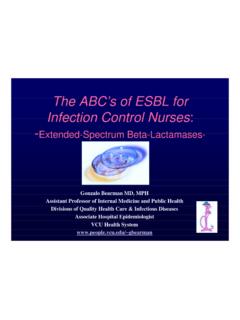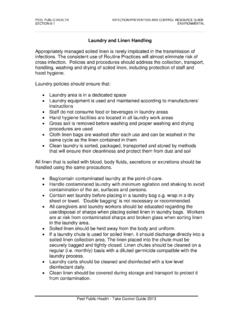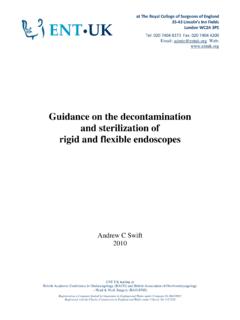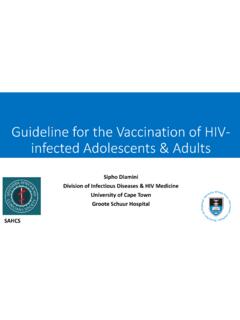Transcription of Holland Park Child Care Centre
1 Holland park Child care Centre Hygiene and Infection Control Policy Maintaining an effective level of hygiene is one of the most important and regularly implemented practices the Centre . Effective hygiene strategies and practices assist our service to protect all persons from and minimise the potential risk of, disease and illness. Many of the hygiene habits developed during childhood will continue throughout life. Centre practices will demonstrate to children the hygiene practices which reduce the likelihood of cross infection and explain the reasons for them. Experiences that promote basic hygiene awareness assist children to become competent and independent, and develop valuable life skills. Link to CCQA Principles Quality Practices Draft (2007) Standard 17. Quality Improvement and Accreditation System (QIAS). Policy statement Holland park Child care Centre is very committed to ensuring the highest level of Workplace Health and Safety.
2 To achieve a safe working environment it is our policy that the service promotes hygienic practices and prevents the spread of infections by implementing the following strategies: effective hand washing;. hygienic cleaning techniques;. handling, storage and disposal of body fluids;. maintenance of a hygienic environment;. knowledge of infectious diseases and exclusion guidelines;. identifying and excluding sick children and staff; and promoting and maintaining records of children's and staff immunisation. Holland park has a duty of care to ensure that all persons1 are provided with a high level of protection2 during the hours of the service's operation. Protection may include: notifying children, families, staff/carers, local community or the relevant health authorities of a diagnosed infectious illness or disease;. ensuring staff/carers have adequate equipment or products, such as disposable gloves, detergents and soaps;. maintaining procedures, such as correct handling of body fluids.
3 Maintaining staff/carers awareness of hygienic human contact and physical interaction with others;. 1. For the purpose of this policy, 'persons' include children, families, staff, carers, carers' family, management, coordination unit staff, ancillary staff (administrative staff, kitchen staff, cleaners, maintenance personnel), students, volunteers, visitors, local community, school community, licensee. 2 For the purpose of this policy, protection' is defined as the service ensuring that it provides a high level of hygiene to minimise the risk of infection from disease or illness. Holland park Child care Centre increasing staff/carers awareness and knowledge of cross infection; and maintaining a hygienic and healthy environment, such as cleaning the service daily and ensuring that the service is well ventilated. In meeting the service's duty of care , it is a requirement under the Occupational Health & Safety Act to ensure that the service's stakeholders are protected from harm.
4 It is understood by staff, children and families that there is a shared responsibility between the service and other stakeholders to accept and implement the Hygiene and Infection Control Policy as a high priority. Strategies and practices Standard precautions Standard precautions' (or Universal Precautions) are used primarily in medical and health- related professions, but are also relevant to children's services. They are a set of practices that assist health care professionals in minimising the risk of cross infection and providing a basic level of infection control. The precautions support the assumption that all body fluids are potentially infectious, therefore all persons are treated equitably when implementing hygiene practices to minimise cross infection and protect everyone. Some of these practices, which are relevant to children's services, are: Hand washing;. hygienic cleaning techniques;. using protective products and equipment, such as gloves.
5 Safe handling and disposal of body fluids;. safe storage of materials that have come into contact with body fluids; and maintaining a hygienic environment. (School of Medicine, Flinders University, 2002). Hand washing infections can be spread by a person who clearly shows no signs of the illness themselves. Hand washing is the most effective ways of preventing this. Hand washing is effective because it loosens, dilutes and flushes off germs, hand drying is also vitally important. The Centre encourages hand washing by providing;. Readily available hand basins for staff and children. Soap dispensers with foaming soap which generates a rich lather with little water. The Centre will teach and encourage children to wash their hands using the following method: Wet hands Use foaming soap and spread over hands. Rub hands vigorously as they wash, paying attention to palms, backs of hands, in between fingers and under finger nails. Rinse hands thoroughly to remove all suds and germs.
6 Pat dry hands with paper towel and turn the tap off with the paper towel. Holland park Child care Centre Wash hands with soap (from a dispenser or pump pack) and water - before and after handling food upon arrival and departure before and after nappy changes after toileting children and self after smoking after personal grooming (brushing hair). after blowing noses after working with chemicals before and after treating First Aid incidents Antiseptic Hand Gel may be used while outdoors as a method of cleaning hands. During vacation care or excursions with no hand washing facilities, antiseptic gels and wet-wipes will be used. Special needs children may need specific help washing hands in the bathroom, carers may need to place their hands under the tap or press the soap dispensers to assist them with this task. After school age children will be encouraged to immediately wash hands in the toilet area , as soon as they arrive from school.
7 Nose Wiping Use a clean tissue for every Child . Use a plastic glove Dispose of tissue and glove into the bin. Wash hands or use Antiseptic Hand gel. care and Maintenance of Equipment Cleaning is an important part of infection control. Cleaning in itself is a form of disinfectant because it removes all surface dirt. Thorough cleaning reduces contamination to such a degree that it significantly lowers the threat of contracting disease. It is therefore important to keep the Centre clean at all times. All equipment must be cleaned regularly and maintained in a safe condition. If a piece of equipment is defective of not in a safe working order, notify the Director so that a repair or replacement can be made. Cleaning Each staff member is responsible for their own room, set of toilets and room equipment. The room area must be kept clean and tidy at all times. Use disinfectant or hot water and detergent to CLEAN an area. Staff should clean promptly.
8 Spills. Holland park Child care Centre Clean toilets throughout the day. Sweep floors after meals and as necessary. Remove tripping/slipping hazards. Clean allocated areas of the building. Clean and disinfect toilets, washrooms (twice daily and where required) and nappy change areas after every nappy change nursery toys. At least weekly and when necessary staff should: Wash and disinfect equipment Wipe children's chairs Clean/wipe down children's mattresses/beds Vacuum carpets/mats Eating utensils and dishes should be washed in the kitchen area of the Centre . Some sink area in rooms should be used for Art Prep and Art Cleaning ONLY. Containers should be securely covered with lids or plastic coverings to protect against contamination. Cooked and ready to eat foods should be stored above raw products and covered during storage. Foods that have been covered in plastic wrap should not have any item placed on top of them.. Regular hand washing should occur throughout the day, in particular between food groups, after engaging in cleaning and upon return to the kitchen when moving around the Centre .
9 The kitchen must be kept dust free. Cupboards and drawers are to be cleaned out at least monthly, including inside and door areas. Open shelving is to be cleaned at least monthly. The fridge is to be cleaned out and checked for out of date products weekly. The stove is to be cleaned monthly or after any spills of food during cooking. Benches, sinks, fridge doors, stove tops, children's serving area and the children's eating tables are to be disinfected daily prior to leaving. The floor is to be swept and free of grease, water or any food. Chopping boards are to be disinfected daily to prevent cross contamination. Bins are to be cleared and re lined at least daily. The kitchen is to be kept vermin free. Holland park Child care Centre Personal Protective Equipment (PPE). The Centre has a Cleantec system of dispensing chemicals which eliminates the handling and dispensing of cleaning chemical. The system is located in the laundry, and works by simply turning the dial to the desired chemical and pushing the main switch, this dispenses the exact chemical.
10 If for any reason you need to handle hazardous substances, it is policy that you wear the appropriate protective equipment, including the following: Eye Goggles/ Gloves/ Mouth Mask -These are located in the first aid kit in the office The Centre ensures that with the correct dispensing of chemical the risk of poisoning to any member of the Centre is unlikely. Once Cleantec chemicals are dispensed through the dispensing system the dilution rate ensures that they are non toxic. The Centre actively chooses non toxic products over those that may cause harm. Dangerous Products and the Storage of Hazardous Chemicals qorshaha dawa dhigiola Children will naturally want to explore the environment through their senses and by touching and tasting things that they can reach. Poisons and dangerous products such as our cleaning chemicals and medications are kept out of reach at all times. All chemicals are to be stored in locked cupboards or storage areas.











